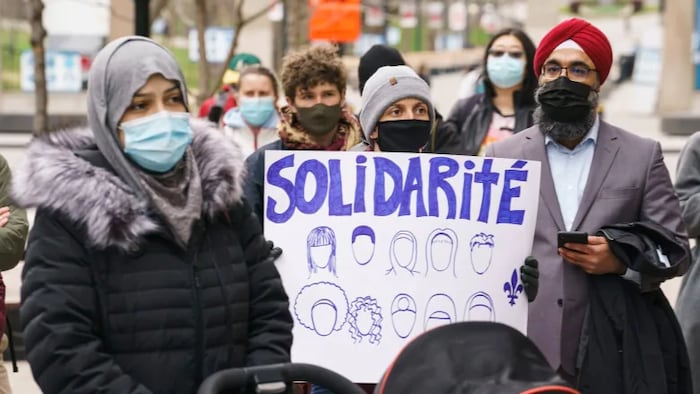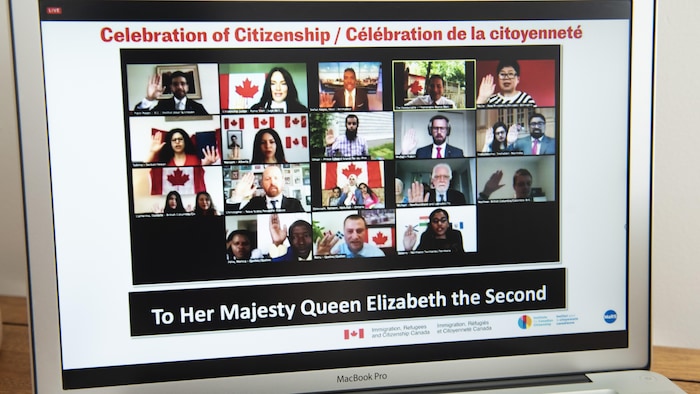What François Legault talks about when he talks about immigration
Legault #Legault

It can be difficult to ascertain what François Legault actually believes about immigration.
The issue wasn’t central to the first campaigns he waged as leader of the Coalition Avenir Québec, the party he co-founded with a billionaire friend.
After a couple of middling election results in 2012 and 2014, however, Legault began to raise immigration with increasing frequency. His proposal to cut immigration levels and impose a values test on newcomers were centrepieces of the party’s platform in 2018, for example, when it swept to power with a convincing majority.
But then as now, when Legault speaks about immigration, he’s liable to utter falsehoods, contradictions, or to flirt with outright xenophobia — often before correcting himself.
And now immigration is again at the forefront of the CAQ’s platform as it campaigns for another term in government, ahead of the Oct. 3 provincial election. And once again Legault has been making comments that he’s forced to correct.
He apologized (new window) earlier this month after suggesting that higher immigration levels would come with extremism and violence.
Des participants à une cérémonie de citoyenneté virtuelle prêtent allégeance à la reine Élisabeth II, le 1er juillet 2020.
Photo: La Presse canadienne / Justin Tang
Only a few days later, during a speech to supporters in Drummondville, Legault said it was Quebec’s closely knit society that allowed it get through the worst of the pandemic.
But that cohesion, he warned, is sometimes shaken and needs protection. Afterward, he was asked by journalists which of his rivals posed the biggest threat to social cohesion.
Legault answered by pointing to the higher immigration levels proposed by the Quebec Liberals and Québec Solidaire, and by invoking the decline of the French language in the province.
Many drew the conclusion that he meant non-francophone immigrants threaten Quebec’s social cohesion.
As opponents, columnists and a federal cabinet minister expressed their disapproval, Legault sought to clarify (new window) what he meant.
Immigration enriches Quebec. But we have a limited capacity for French-language integration, he said, in French, naturally.

From left to right, Conservative Leader Eric Duhaime, Liberal Leader Dominique Anglade, Quebec Solidaire co-spokesperson Gabriel Nadeau-Dubois, Parti-Quebecois Leader Paul St-Pierre Plamondon, Legault and moderator Pierre Brunei, stand on the set prior to the leaders debate in Montreal, on Sept. 15.
Photo: POOL / Journal de Montréal / POOL / Martin Chevalier / Journal de Montréal
Legault is campaigning on a promise to limit immigration to 50,000 people per year, a figure meant to maintain the status quo, even though business groups say more is needed to address a dire labour shortage (new window).
But his tendency to backtrack raises questions about his true motivation for the freeze.
At times, he says it’s necessary to limit immigration to protect the French language. Other times, he says it’s to protect the more nebulous concept of Quebecois values.
It may be possible, though, to piece together a more complete understanding of Legault’s views about immigration from a history of his comments.
‘A duty to protect this society’
Legault has long maintained the cultural practices of immigrants, particularly from Muslim countries, pose a threat to Quebec’s values.
In 2016, with his party mired in third place in the polls, Legault said immigrants who supported the burkini — a swim suit designed for Muslim women — shouldn’t be granted citizenship.
It also became part of his party’s plan at the time to force immigrants to pass a values test or be kicked out of the province.
Defending the idea in 2018, Legault said: I’m proud of the kind of society our ancestors left us and I think we have a duty to protect this society.
As premier, Legault implemented the values test, though the consequences for getting a failing grade were softened when he was forced to acknowledge Quebec doesn’t have jurisdiction over deportations.
His government also passed legislation banning religious symbols in large parts of the civil service, which Legault has sometimes justified as a message to newcomers that in Quebec, this is how we live.
More recently, Legault has associated immigration with the decline of the French language.
At a speech in May, he insisted that Quebec needed more control of the family reunification stream of immigration in order to limit the number of non-francophones the province accepts each year.

People take part in a demonstration following a Superior Court ruling on Bill 21, Quebec’s secularism law, in Montreal on Tuesday, April 20, 2021.
Photo: (Paul Chiasson/The Canadian Press)
Without those added powers, Legault said, Quebec would become as francophone as Louisiana. Language experts have said that while French remains fragile in Quebec, Legault was exaggerating, given that 94 per cent of the population can carry on a conversation in French, according to Statistics Canada.
But then, Legault has expressed disdain for Ottawa’s family-reunification program before.
It’s become so that it’s no longer just the children of parents, it’s uncles, aunts, cousins … they come in with zero conditions. And the majority don’t speak French, he told Le Devoir in 2017.
Legault’s description resembled what anti-immigration politicians in the U.S. call chain migration, often when criticizing more liberal policies that are allegedly abused by immigrants.
But Legault’s statement was false. Only spouses and direct descendants are generally eligible (new window) under the family reunification program, which does indeed have a long list of conditions.
Later that year, he began using the term illegal migrants to refer to the asylum-seekers crossing at Roxham Road, an unofficial border crossing where tens of thousands have entered Quebec from the U.S. in recent years.
Legault, who continues (new window) to call on Ottawa to shut the crossing, warned of political consequences if steps weren’t taken to limit the number of refugees arriving in Quebec.
The attitude of generosity and solidarity on behalf of Quebecers toward refugees is shaken, Legault said in 2017. And if political officials don’t change their attitude, we can expect a backlash.
Following Switzerland’s example
From this collection of statements, a common theme seems to emerge.
Whether discussing values, language or sheer numbers, immigration appears to be associated in Legault’s mind with a force that could destabilize Quebec society — a potential problem that needs to be managed, as opposed to a resource that can be tapped.
In recent days, he has given two more examples of his thinking.
Earlier this week, while trying to explain why he was so worried about social cohesion, Legault cited Sweden and Germany as two countries struggling to integrate immigrants.
He refused to expand on why he mentioned those countries in particular, but both have seen anti-immigrant parties rise in popularity as they accepted large numbers of refugees from Muslim countries.
Switzerland, on the other hand, is the model Quebec should follow, Legault said at another point in the campaign.
That country, which has roughly the same population as Quebec, has some of the most stringent citizenship requirements in Europe.
Jonathan Montpetit (new window) · CBC New
